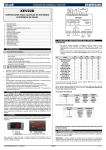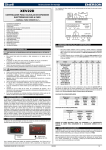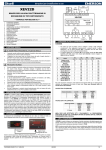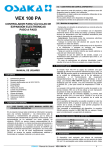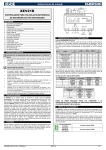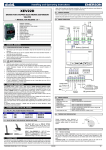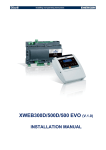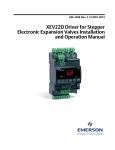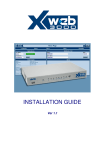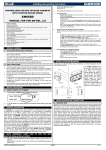Download Emerson XEV22D Technical data
Transcript
XEV22D DRIVER FOR STEPPER ELECTRONIC EXPANSION VALVES --- MANUAL FOR RELEASE 0.8 --- 1. 2. 3. 4. 5. 6. 7. 8. 9. 10. 11. 12. 13. 14. 15. 16. GENERAL WARNING ____________________________________________________________ GENERAL DESCRIPTION ________________________________________________________ WIRING CONNECTIONS _________________________________________________________ VALVE CONNECTIONS AND CONFIGURATION _____________________________________ ABSOLUTE MAXIMUM POWER ___________________________________________________ FRONT PANEL _________________________________________________________________ USER INTERFACE ______________________________________________________________ PARAMETER LIST ______________________________________________________________ DIGITAL INPUTS _______________________________________________________________ FORCED OPENING _____________________________________________________________ ELECTRICAL CONNECTIONS ____________________________________________________ RS485 SERIAL LINE _____________________________________________________________ HOW TO: USE THE HOT-KEY ____________________________________________________ DISPLAY MESSAGES ___________________________________________________________ TECHNICAL DATA ______________________________________________________________ STANDARD VALUES ____________________________________________________________ 1 1 1 1 1 2 2 2 3 3 3 3 3 3 4 4 4. VALVE CONNECTIONS AND CONFIGURATION !!!!!!!!!! WARNING !!!!!!!!!!!!!! To avoid any possible problem, before connecting the valve configure the driver by making the right changes on the parameters. Select the kind of motor (tEU parameter) and check if the valve is present in tEP parameter table reported here below: 1. GENERAL WARNING 1.1 PLEASE READ BEFORE USING THIS MANUAL This manual is part of the product and should be kept near the instrument for easy and quick reference. The instrument shall not be used for purposes different from those described hereunder. It cannot be used as a safety device. Check the application limits before proceeding. 1.2 SAFETY PRECAUTIONS Check the supply voltage is correct before connecting the instrument. Do not expose to water or moisture: use the controller only within the operating limits avoiding sudden temperature changes with high atmospheric humidity to prevent formation of condensation Warning: disconnect all electrical connections before any kind of maintenance. Fit the probe where it is not accessible by the End User. The instrument must not be opened. In case of failure or faulty operation send the instrument back to the distributor or to “Dixell S.r.l.” (see address) with a detailed description of the fault. Consider the maximum current which can be applied to each relay (see Technical Data). Ensure that the wires for probes, loads and the power supply are separated and far enough from each other, without crossing or intertwining. In case of applications in industrial environments, the use of mains filters (our mod. FT1) in parallel with inductive loads could be useful. tEP Model 0 1 2 3 4 5 6 7 8 9 10 11 12 13 Manual settings Alco EX4-EX5-EX6 Alco EX7 Alco EX8 500 Danfoss ETS-25/50 Danfoss ETS-100 Danfoss ETS-250/400 Sporlan SEI 0.5-11 Sporlan SER 1.5-20 Sporlan SEI 30 Sporlan SER(I) G,J,K Sporlan SEI 50 Sporlan SEH(I) 100 Sporlan SEH(I) 175 uSt (steps*10) Par 75 160 260 262 353 381 159 159 319 250 638 638 638 CPP (mA*10) Par 50 75 80 10 10 10 16 12 16 12 16 16 16 CHd (mA*10) Par 10 25 50 10 10 10 5 5 5 5 5 5 5 Sr (step/s) Par 500 500 500 300 300 300 200 200 200 200 200 200 200 If you can see your valve on the table, please select the valve through tEP parameter. In this way, you can be sure of a right configuration. About the connection, please pay attention to the following table to have a quick reference on the connection mode for valves of different manufacturer. In any case, the unique and valid reference has to be considered the datasheet made by manufacturer of the valve: 4 WIRES VALVES (BIPOLAR) Connection numbering 4 2 3 1 2. GENERAL DESCRIPTION The XEV22D module is able to drive a large variety of stepper electronic expansion valves. XEV22D permits to regulate the superheat (SH) of the fluid that runs into refrigerating unit in order to obtain optimized performance and a functioning of the evaporator independent by climatic or load conditions. XEV22D modules are equipped with two probe inputs, one for 4 to 20mA or 0 to 5V pressure transducer and another one for NTC-EU or NTC-US temperature probe. A LAN connection permits to transmit the pressure signal to others XEV modules in order to use only one pressure transducer in multiplexed cabinet applications. There are also two configurable digital inputs, the first one is free of voltage and the other ones is at high voltage in order to simplify connections with cooling request signal. With the useful display it’s possible to see the value of superheat (SH), the degree of opening of the valve or the probe values, the local keyboard allows to program the instrument without any other devices. To complete instrument equipment, a RS485 serial link permits to connect XEV22D to dIXEL monitoring and supervising systems. LSt (steps*10) Par 5 10 10 7 10 11 0 0 0 0 0 0 0 SPORLAN SEI-SEH WHITE BLACK RED GREEN ALCO EX BLUE BROWN BLACK WHITE DANFOSS ETS BLACK WHITE RED GREEN 5-6 WIRES VALVES (UNIPOLAR) Connection numbering 4 2 3 1 5 – Common 3. WIRING CONNECTIONS The superheat regulation is performed only when the cooling digital input is enabled. The following scheme shows how the device takes the request of cooling: SPORLAN SAGINOMIYA ORANGE RED YELLOW BLACK GRAY ORANGE RED YELLOW BLACK GRAY AFTER MAKING THE CONNECTION, PLEASE SWITCH OFF AND ON THE XEV CONTROLLER IN ORDER TO BE SURE OF THE RIGHT POSITIONING OF THE VALVE. 5. ABSOLUTE MAXIMUM POWER XEV22D is able to drive a wide range of stepper valves, in the following table are indicated the maximum values of current that the actuator can supply to the stepper wiring. The dIXEL transformer to use is the TF20D. VALVE TYPE Please see the following scheme to make the right wirings. With "First Level" are indicated the connections on the floor of the 4 DIN module and, of course, with "Second Level" the connections of the 1st floor that are only for the stepper motor of the valve and for HOT-KEY. NOTE: the electrical power absorption of the valve can be unrelated to refrigeration power that valve has. Before using the actuator, please read the technical manual of the valve supplied by the manufacturer and check the maximum current used to drive the valve in order to verify that they are lower than those indicated below. 1592025920 XEV22D GB r3.0 02.02.2011.doc XEV22D BIPOLAR VALVES (4 wires) Maximum Current 0.9A UNIPOLAR VALVES (5-6 wires) Maximum Current 0.33A 1/1 6. FRONT PANEL 8. PARAMETER LIST To display and to modify the set point. In programming mode it selects a parameter or it confirms a value. By pressing and releasing this key, it’s possible to see the values of the probes. In programming mode it slides the codes of the parameters or it increases their values. In programming mode it slides the codes of parameters or it decreases their values. NOTE: REGULATION FtY PEo PEd tEU KEYS COMBINATIONS 6.1 + To lock or to unlock the keyboard + To enter programming mode. tEP XEV22D LEDS On display there are some luminous dots. Their meaning is described in the following table: LED MODE Function ON Low pressure alarm ON Maximum Operating Pressure alarm OFF Valve is completely closed BLINKING ON Valve is moving Valve is completely opened BLINKING Serial communication present OFF Serial communication absent ON Superheat alarm tEP Model 0 1 2 3 4 5 6 7 8 9 10 11 12 13 Manual settings Alco EX4-EX5-EX6 Alco EX7 Alco EX8 500 Danfoss ETS-25/50 Danfoss ETS-100 Danfoss ETS-250/400 Sporlan SEI 0.5-11 Sporlan SER 1.5-20 Sporlan SEI 30 Sporlan SER(I) G,J,K Sporlan SEI 50 Sporlan SEH(I) 100 Sporlan SEH(I) 175 HFS 7.1 HOW TO: SEE THE READ-ONLY VALUES 1) 2) 3) 4) 5) Press and release UP button. First read-only label is showed; Brows parameter labels with UP or DOWN buttons. Press SET to see read-only value. To change parameter, press SET. To leave the fast access menu, press and release SET+UP or wait for time-out to expire (about 3 minutes). 7.2 HOW TO: SEE THE SET POINT 1) 2) Press the SET buttons until the set point will be showed. To come back to see temperature, wait about 5s or press newly SET key. 7.3 HOW TO: MODIFY THE SET POINT LSt USt To change the set point value operate as follows: 1) Press the SET button until the set point will be showed. 2) Use UP or DOWN buttons to change its value. 3) Press SET button to store the new value. ESt Sr HOW TO: ENTERING “PR1” PARAMETER MENU CPP To enter in “Pr1” level menu: 1) Pressing SET+ DOWN buttons for about 3 seconds. 2) Instruments shows first parameter in Pr1 menu CHd oPE 7.5 HOW TO: ENTERING “PR2” PARAMETER MENU SFd To enter to “Pr2” parameters list: 1. Enter to “Pr1”. 2. Select “Pr2” parameter and press SET. 3. The “PAS” label will be shown, then “0--” with 0 blinking. 4. Insert “321” password through UP and DOWN buttons, then press SET to confirm. 7.6 Sti Std MnF FoP HOW TO: CHANGE A PARAMETERS VALUE To change the parameter’s value operate as follows: 1. Enter the Programming mode by pressing the Set and DOWN button for about 3s. 2. Select the required parameter. 3. 4. 5. Kind of gas: (R22, 134, 404, 407, 410, 507, CO2) type of gas used by plant. This is a fundamental parameter for correct functioning of all system. Probe Error opening percentage: (0 to 100%) if a temporary probe error occurs, valve opening percentage is PEo until PEd time is elapsed. If PEO is different from 0 it assures cooling also with probe error, because even if the device cannot calculate superheat the valve can work at PEo percentage. Probe Error delay before stopping regulation: (0 to 239sec; 240=On=unlimited) if probe error duration is higher than PEd, valve will close completely and “Pf” message will be showed. With PEd=on, valve opening is PEo until probe error finishes. Type of Stepper motor: (UP; bP) it permits to select the kind of valve. UP = 5-6 wires unipolar valves; bP = 4 wires bipolar valves. !!!!! WARNING !!!!! by changing this parameter the valve has to be reinitialized. Predefined valve selection: (0 to 13) if tEP=0 the user has to modify all the parameters of configuration in order to use the valve. If tEP is different from 0 the device performs a fast configuration of the following parameters: LSt, USt, Sr, CPP, CHd. To select the right number please read the following table: LSt (steps*10) Par 5 10 10 7 10 11 0 0 0 0 0 0 0 uSt (steps*10) Par 75 160 260 262 353 381 159 159 319 250 638 638 638 CPP (mA*10) Par 50 75 80 10 10 10 16 12 16 12 16 16 16 CHd (mA*10) Par 10 25 50 10 10 10 5 5 5 5 5 5 5 Sr (step/s) Par 500 500 500 300 300 300 200 200 200 200 200 200 200 If tEP is different from 0, previous configuration of LSt, uSt, Sr, CPP and CHd will be overwritten. 7. USER INTERFACE 7.4 All pressure parameters are relatives or absolutes depending on the PrM parameter. Kind of motor movement: (HAF; FUL) HAF = half step. Use this setting for the unipolar valve. FUL = half step. Use this setting for the bipolar valve. Minimum number of steps: (0 to USt (*10)) it permits to select the minimum number of steps. At this number of steps the valve should be closed. So it’s necessary the reading of manufacturer datasheet to set correctly this parameter. It’s the minimum number of steps to stay in advised range of functioning. !!!!! WARNING !!!!! after changing this parameter the valve will have to be reinitialized. The device performs this procedure automatically and restarts its normal functioning when the programming mode ends. Maximum number of steps: (LSt to 800 (*10)) it permits to select the maximum number of steps. At this number of steps the valve should be completely opened. Read the datasheet provided by manufacturer of the valve to set correctly this parameter. It’s the maximum number of steps to stay in advised range of functioning. !!!!! WARNING !!!!! after changing this parameter the valve will have to be reinitialized. The device performs this procedure automatically and restarts its normal functioning when the programming mode ends. Extra step in closing phase: (0 to 255 (*10)) it sets the number of extra steps the controller performs, when the valve is closed at start up, to force the closure of the valve. Step rate: (10 to 600 step/sec) it is the maximum speed to change step without losing precision (=losing steps). It’s advised to stay under the maximum speed. Current per phase (only bipolar valves): (0 to 100 (*10mA)) it is the maximum current per phase used to drive valve. It’s used only with bipolar valves. Holding current per phase (only bipolar valves): (0 to 100 (*10mA)) it is the current per phase when the valve is stopped for more than 4 minutes. It’s used only with bipolar valves. Start opening Percentage: (0 to 100%) opening valve percentage when start function is active and during post defrost phase. This phase duration is SFd time. Start Function duration: (0.0 to 42min 00s, res. 10s) it sets start function duration and post-defrost duration. During this phase the alarms are neglected. Stop regulation interval: (0.0 to 24h 00min. res. 10min) after regulating continuously for Sti time, the valve closes for Std time in order to prevent ice creation. Stop duration: (0 to 60 min) it defines stop regulation time after Sti. During this stop display shows StP message. Maximum opening percentage at normal Functioning: (0 to 100%) during regulation it sets the maximum valve opening percentage. Forced Opening percentage: (0 to 100; nU) if FoP=nU valve works with regulation algorithm. If FoP is different from nU the valve stays at FoP opening percentage. This function could be useful during plant starting or during service operations. PI PARAMETERS (trained staff) Pb Proportional band: (0.1 to 50.0°C; 1 to 90°F) PI proportional band. A value bigger than 5°C is advised. Press the SET button to display the value. Use UP or DOWN to change the value. Press SET to store the new value and move to the following parameter. To exit: Press SET + UP or wait 30s without pressing any button. NOTE: the set value is stored even when the procedure is exited by waiting the time-out to expire. 1592025920 XEV22D GB r3.0 02.02.2011.doc XEV22D 2/2 rS d1S d2S Band Offset: (-12.0 to 12.0°C; -21 to 21°F) PI band offset. It permits to move the proportional band of the PI. With rS=0 the band is between [SEt to SEt+Pb]. inC Adr Mod Ptb rEL Pr2 Integration time: (0 to 255s) PI integration time. PROBE PARAMETERS tPP LPP PA4 P20 oPr ttE otE Type of Pressure transducer: (420; 5V; LAn) it sets type of pressure transducer to use. 420 = 4 to 20mA pressure transducer; 5V = 0 to 5V ratiometric transducer; LAn = the pressure signal comes from another XEV module. Enable pressure probe sending in LAN: (n; Y) if LPP=Y the value of pressure read by device is sent in LAN. Only one device of the LAN can have LPP=Y. Probe value at 4mA or at 0V: (-1.0 to P20 bar; -14 to P20 psi) pressure value measured by probe at 4mA or at 0V (related to PrM parameter). Probe value at 20mA or at 5V: (PA4 to 50.0 bar; PA4 to 725 psi) pressure value measured by probe at 20mA or at 5V (related to PrM parameter). Pressure probe calibration: -12.0 to 12.0 bar; -174 to 174 psi. Type of temperature probe: (PtM; ntC) it allows to set the kind of probe used by the instrument: PtM = PT1000 probe, ntC = NTC-US probe. Temperature probe calibration: -12.0 to 12.0°C; -21 to 21°F. DIGITAL INPUTS i1P i1F d1d i2P i2F d2d Digital Input 1 (Free of voltage) digital input polarity: (cL, oP) CL = activated when closed; oP = activated when opened. Digital Input 1 (Free of voltage) digital input function: (CCL, rL) CCL = cooling call; rL = digital input activates relay. Digital Input 1 (Free of voltage) activation delay: (0 to 255 min) this activation delay is used only if digital input is configured as rL. Digital Input 2 (High voltage) digital input polarity: (CL, oP) CL = activated when closed; oP = activated when opened. Digital Input 2 (High voltage) digital input function: (CCL, rL) CCL = cooling call; rL = digital input activates relay. Digital Input 2 (High voltage) activation delay: (0 to 255 min) this activation delay is used only if digital input is configured as rL. ALARM dAo tdA LPL MoP LoP PHY dML MSH LSH SHY SHd FrC 9. DIGITAL INPUTS The device is provided with two digital inputs. One is free of voltage and the other is at high voltage and both can be configured as cooling call. In this way the cooling signal can come from instruments with direct load outputs or via instruments with output without voltage. One of these inputs must be configured as cooling call. 10. FORCED OPENING If necessary, by changing FoP parameter it’s possible to force the valve opening. For example, by setting FoP=50 the valve will be open at half of full scale. To disable this function it’s necessary to set FoP=nU (default value). The valve opening is enabled only when CCL digital input is enabled. 11. ELECTRICAL CONNECTIONS The instrument is provided with pluggable screw terminal block to connect cables with a cross section up to 2.5 mm2. Heat-resistant cables have to be used. Before connecting cables make sure the power supply complies with the instrument’s requirements. Separate the probe cables from the power supply cables, from the outputs and the power connections. Do not exceed the maximum current allowed on each relay, in case of heavier loads use a suitable external relay. 11.1 CF PMU rES PrM CLP tP1 PPr tP2 oPP PROBES Advised temperature probe placement is illustrated in figure nearby. Between 0 and 180 inclination degrees respect to horizontal pipe section. For suction pressure probe there aren’t any particular prescriptions 12. RS485 SERIAL LINE Alarm delay after restarting regulation: (0.0 to 42min 00s, res. 10s) time between digital input activation (configured as CCL) and alarm signalling. The LSH alarm is always signalled also during this time. Type of alarm signalled by relay: (ALL, SH, PrE, di) ALL = all alarm; SH = superheat alarm; PrE = pressure alarm; di = activation only when digital input configured as rL is active. Lower Pressure Limit for superheat regulation: (PA4 to P20 bar; PA4 to P20 psi) when suction pressure comes down to LPL, the regulation is performed with a LPL fixed value for pressure. When suction pressure comes back to LPL, the normal pressure value is used (related to PrM parameter). Maximum Operating Pressure threshold: (LoP to P20bar; LoP to P20 psi) if suction pressure exceeds maximum operating pressure value, the instrument signals this situation with an alarm LED (related to PrM parameter). Lowest Operating Pressure: (PA4 to MoP bar; PA4 to MoP psi) if the suction pressure comes down to this value, a low pressure alarm will be signalled with an alarm LED (related to PrM parameter). Pressure alarm Hysteresis: (0.1 to 5.0 bar, 1 to 72 psi) pressure hysteresis to disable alarm signalling. Delta MoP-LoP: (0 to 100%) when a MoP alarm occurs valve will close of the dML percentage every one second until MoP alarm is active. When LoP occurs, valve will open of the dML percentage every one second until LoP alarm is active. Maximum SuperHeat alarm: (LSH to 80.0°C; LSH to 144°F) when superheat exceeds this value, an high superheat alarm will be signalled after interval SHd. Lowest SuperHeat alarm: (0.0 to MSH°C; 0 to MSH°F) when superheat goes down to this value a low superheat alarm is signalled after interval SHd. SuperHeat alarm Hysteresis: (0.0 to 25.5°C; 1 to 77°F) hysteresis for superheat alarm deactivation. SuperHeat alarm activation delay: (0 to 255 s) when a superheat alarm occurs, the delay time SHd have to expire before signalling this alarm. Fast-recovery Constant: (0 to 100 s) permits to increase integral time when SH is below the set-point. If FrC=0 fast recovery function is disabled. All models can be connected to the monitoring and supervising system XWEB3000. If Mod=Std standard ModBUS-RTU protocol is used, if Mod=AdU custom XWEB library is required. This last configuration makes possible to use the same serial address of the thermostat that gives the cooling request to XEV. In this way, it’s possible to reduce the number of addresses used. 13. HOW TO: USE THE HOT-KEY 13.1 PROGRAM A HOT KEY FROM THE INSTRUMENT (UPLOAD) 1) 2) Program one controller with the front keypad. When the controller is ON, insert the “Hot-Key” and push UP button; the “uPL” message appears followed a by flashing “End”. Push SET button and the “End” will stop flashing. Turn OFF the instrument, remove the “Hot-Key” and then turn it ON again. 3) 4) NOTE: the “Err” message is displayed in case of any failed programming operation. In this case, push again UP button if you want to restart the upload again or remove the “Hot-key” to abort the operation. 13.2 PROGRAM AN INSTRUMENT USING A HOT KEY (DOWNLOAD) 1) 2) 3) Turn OFF the instrument. Insert a pre-programmed “Hot-Key” into the 5-PIN connector and then turn the Controller ON. Automatically the parameter list present into the “Hot-Key” will be downloaded into the Controller memory. The “doL” message will blink during this operation, followed a by a flashing “End” label. After 10 seconds the instrument will restart working with the new parameters. Remove the “Hot-Key”. 4) 5) NOTE: the “Err” message is displayed in case of any failed programming operation. In this case, push again UP button if you want to restart the upload again or remove the “Hot-Key” to abort the operation. 14. DISPLAY MESSAGES Mess. “nA” DISPLAY Lod Free of voltage digital input State (read only): it shows the free of voltage digital input. High voltage digital input State (read only): it shows the high voltage digital input state. RS485 Serial Address: (1 to 247) Identifies the instrument address when connected to a ModBUS compatible monitoring system. ModBus: (AdU; Std) AdU = (Only for XWEB systems) in this case XEV and thermostatic controller are considered an alone instrument (it requires a custom library for XWEB); Std = to use XEV in stand-alone mode, in this case normal Modbus-RTU protocol is used. Parameters map: (read only) it identifies parameters map written by factory. Release Firmware: (read only) it shows firmware release. Second level menu. Local display: (SH; PEr; P1; P2) SH = superheat; PEr = valve opening percentage; P1 = value of temperature measured; P2 = pressure measured by P2 probe. Temperature measurement units: (°C; °F) °C = Celsius degree; °F = Fahrenheit degree. NOTE: by changing measurement unit, the regulation parameters have to be correctly changed. Pressure Measurement units: (bAr, PSi) bAr = bar; PSi = psi. NOTE: by changing measurement unit, the regulation parameters have to be correctly changed. Resolution (only °C): (dE; in) dE = decimal format; in = integer format. Pressure visualization Mode: (rEL; AbS) rEL = relative pressure; AbS = absolute pressure. All pressure parameters depend on this parameter. Cooling Percentage (read only): Display the cooling percentage. Temperature Probe value (read only): it shows temperature probe value from P1. Pressure probe value (read only): it shows pressure probe value. The value depends on PrM. Temperature from P2 (read only): it shows temperature obtained from conversion of pressure value. Opening Percentage (read only): it shows the actual opening percentage of the valve. 1592025920 XEV22D GB r3.0 02.02.2011.doc “PF” “P1” “P2” “HSH” “LSH” “LPL” “MoP” “LoP” “StF” “StP” “EE” 14.1 Cause None of digital inputs configured as CCL are activated The Ped time is elapsed and the regulation is stopped Temperature probe fault Pressure transducer fault High superheat alarm Low superheat alarm Low pressure limit Maximum Operating Pressure Lowest Operating Pressure Start Function enabled Regulation stop caused by Std and Sti Memory error Outputs Valve closed Valve closed after PEd. There is a probe error According to PEo and PEd. According to PEo and PEd. By PI Valve Closed see LPL parameter see dML parameter see dML parameter see SFd parameter Valve closed - ALARM RECOVERY Probe alarms “P1”, “P2” start few seconds after the fault in the probe; they automatically stop few seconds after the probe restarts normal operation. Check connections before replacing the probe. Max. And min. Alarms “HSH”, “LSH”, “MoP” and “LoP” automatically stop as soon as the variable returns to normal values. XEV22D 3/3 The instrument is provided with an internal check verifying memory integrity. Alarm “EE” will flash when a failure in the internal memory is detected. In such case call the service. PMu rES PrM CLP tP1 PPr tP2 oPP d1S d2S Adr Mod Ptb rEL Pr2 15. TECHNICAL DATA Housing: self extinguishing ABS. Case: 4 DIN modules 70x135mm with male and female connectors; depth 60mm. Mounting: DIN RAIL mounted in an omega (3) din rail. Protection: IP20. Connections: pluggable screw terminal block 2.5 mm2 wiring. Power supply: 24Vac/dc ±10%. Power absorption: depending on connected valve 20VA max. Display: three digits with icons, red LEDs, height 14.2 mm. Inputs: 1 temperature probe: PT1000 probe: -50 to 110°C (-58 to 230°F). NTC probe: -40 to 110°C (-40 to 230°F). 1 pressure transducer: 4 to 20mA or 0 to 5V. Digital inputs: 1 free of voltage. 1 high voltage. Outputs for valve: bipolar or unipolar valves. Data storage: on the non-volatile memory (EEPROM). Kind of action: 1B. Pollution degree: normal. Software Class: A. Operating temperature: 0 to 55°C (32 to 131°F). Storage temperature: -25 to 60°C (-13 to 140°F). Relative humidity: 20 to 85% (no condensing). Resolution: 0.1°C or 1°F. Precision a 25°C (77°F): ±0.7°C ±1digit. Pressure measurement unit Resolution (only °C) Type of pressure (Absolute / relative) Cooling call percentage Temperature probe value Pressure probe value Temperature converted from pressure probe Acutal Opening percentage Free of voltage digital input state Main voltage digital input state Serial address Modbus type Parameters map Release software Second level menu bAr; PSi dE; in rEL; AbS Read only Read only Read only Read only Read only Read only Read only 1 to 247 Std; AdU ------- bAr dE rEL --- -----------1 Std ------- Pr2 Pr2 Pr2 Pr2 Pr1 Pr1 Pr1 Pr1 Pr1 Pr1 Pr2 Pr2 Pr2 Pr2 Pr1 16. STANDARD VALUES Label FtY Description Kind of gas Peo Probe Error opening percentage Ped Probe Error delay before stopping regulation tEU Type of Stepper motor tEP Automatic Valve configuration HFS Kind of driving LSt Minimum number of steps USt Maximum number of steps ESt Extra steps in closing phase Sr Step rate CPP Current per phase (only bipolar valves) CHd Holding current per phase (only bipolar valves) oPE Start opening Percentage SFd Start Function duration Sti Stop regulation interval Std Stop duration MnF Maximum opening percentage FoP Forced Opening time-out PI PARAMETERS (trained staff) Pb Proportional band rS Band Offset inC Integration time PROBE PARAMETERS tPP Type of pressure transducer LPP Enable pressure probe sending in LAN Probe value at 4mA or at 0V (related to PrM PA4 parameter) Probe value at 20mA or at 5V (related to PrM P20 parameter) oPr Pressure probe calibration ttE type of temperature probe otE Temperature probe calibration DIGITAL INPUTS i1P Free of voltage digital input polarity i1F Free of voltage digital input function d1d Digital input 1 (free of voltage) activation delay i2P Main voltage digital input polarity i2F Main voltage digital input function d2d Digital input 2 (Main voltage) activation delay ALARMS dAo Alarm delay after restarting regulation tdA Type of alarm signalled by relay Lower pressure limit for superheat regulation LPL (related to PrM parameter) Maximum operating pressure threshold (related MoP to PrM parameter) Minimum suction pressure limit (related to PrM LoP parameter) PHy Pressure alarm Hysteresis dML delta MoP-LoP MSH Maximum superheat alarm LSH Lowest superheat alarm SHY Superheat hysteresis SHd FrC DISPLAY Lod Superheat alarm activation delay Fast-Recovery Constant CF Temperature measurement units Local display 1592025920 XEV22D GB r3.0 02.02.2011.doc Range R22; 134; 404; 407; 410; 507; Co2 0 to 100 % 0 to 239 s; on uP; bP 0 to 10 HAF; FUL 0; USt (*10) LSt to 800 (*10) 0 to 255 (*10) 10 to 600 step/s 0 to 100 (*10mA) 0 to 100 (*10mA) 0 to 100 % 0.0 to 42min 00s, res. 10s 0.0 to 24h 00min, res. 10min 0 to 60 min 0 to 100 % 0 to 100 %; nU [0.1 to 50.0°C] [1 to 90°F] [-12.0 to 12.0°C] [-21 to 21°F] 0 to 255 s [10.0°C] [50°F] [0.0°C] [0°F] 120 420; 5V; LAn n; Y [-1.0 to P20 bar] [-14 to P20 psi] [ PA4 to 50.0 bar] [PA4 to 725 psi] [-12.0 to 12.0 bar] [-174 to 174 psi] PT1000; ntC [-12.0 to 12.0°C] [-21 to 21°F] 420 n [-0.5 bar] [-7 psi] [11.0 bar] [159 psi] [0.0 bar] [0 psi] ntC [0.0°C] [0°F] Pr2 Pr2 CL; oP CCL; rL 0 to 255 min CL; oP CCL, rL 0 to 255 min CL CCL 0 CL CCL 0 Pr2 Pr2 Pr2 Pr2 Pr2 Pr2 0.0 to 42min 00s, res. 10s ALL; SH; PrE; Di [PA4 to P20 bar] [PA4 to P20 psi] [LoP to P20 bar] [LoP to P20 psi] [PA4 to MoP bar] [PA4 to MoP psi] [0.1 to 5.0 bar] [1 to 72 psi] 0 to 100% [LSH to 80.0°C] [LSH to 176°F] [0.0 to MSH°C] [0 to MSH°F] [0.1 to 25.5°C] [1 to 77°F] 0 to 255 s 0 to 100 s 10.0 ALL [-0.5 bar] [-7 psi] [11.0 bar] [159 psi] [-0.5 bar] [-7 psi] [0.1 bar] [1 psi] 30 [80.0°C] [144°F] [2.5°C] [2°F] [0.1°C] [1°F] 120 50 Pr2 Pr2 SH; PEr; P1; P2 SH [°C] [°F] Pr1 °C; °F Default Level 404 Pr2 50 on bP 1 FUL See tEP See tEP 0 See tEP See tEP See tEP 85 1.3 0 0 100 nU Pr2 Pr2 Pr2 Pr2 Pr2 Pr2 Pr2 Pr2 Pr2 Pr2 Pr2 Pr2 Pr2 Pr2 Pr2 Pr2 Pr2 Pr2 Pr2 Pr2 Pr2 Pr2 Pr2 Pr2 Pr2 Pr2 Pr2 Pr2 Pr2 Pr2 Pr1 Pr1 Pr2 Pr1 Pr2 Pr2 XEV22D 4/4




